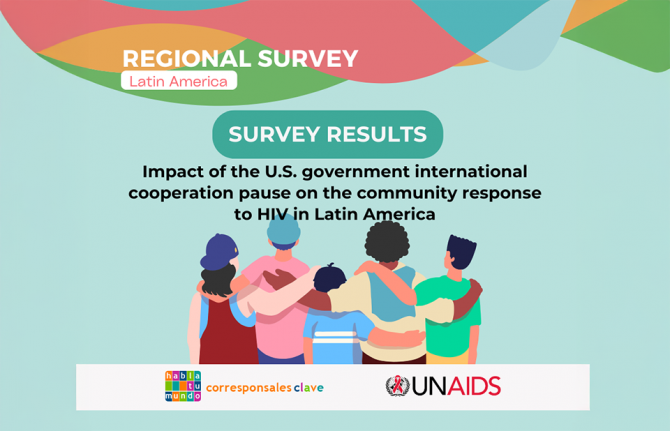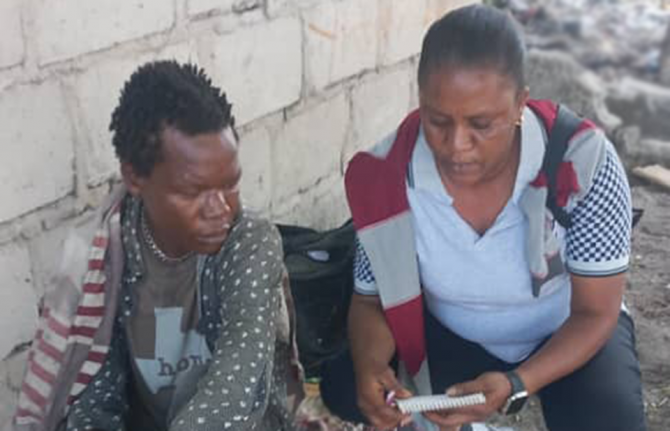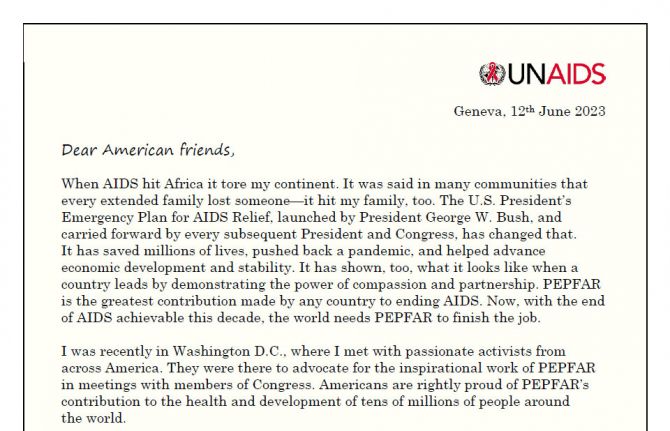
Feature Story
Red Ribbon Award winners honoured
07 August 2008
07 August 2008 07 August 2008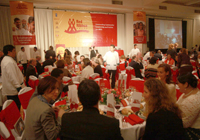
2008 Red Ribbon Award Ceremony and Dinner was held 6 August 2008
Credit: UNAIDS/agencialibrefoto
Representatives of 25 Red Ribbon Award 2008 winning communities were guests of honour at a formal Award Ceremony and Dinner, held last night in Mexico City and attended by government officials and global AIDS leaders. UNAIDS Executive Director Dr Peter Piot addressed the Awards Ceremony at which five organizations were selected by a jury for special recognition in the following categories:
- Providing access to treatment, support and care
- Supporting children orphaned by AIDS
- Promoting human rights
- Empowering women and girls
- Providing HIV prevention programs and services
The communities singled out for special recognition are:
- Centre for Popular Education and Human Rights, Ghana
- Sanghamitra, A Women’s Collective, India
- Hamyaran Mosbat – The Mashhad Positive Club, Iran
- Consol Homes, Malawi
- Fortalecidendo la Diversidad, Mexico
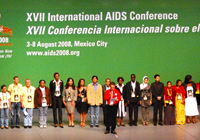
The Red Ribbon Award is presented every
two years at the International AIDS
Conference to recognize and celebrate
outstanding community leadership and
action.
Credit: UNAIDS/agencialibrefoto
“These are extraordinary organizations helping to meet the needs of their own communities in often very difficult circumstances,” said Rebecca Grynspan, Director of the Regional Bureau for Latin America and the Caribbean of the United Nations Development Programme (UNDP), during the awards ceremony.
“In doing so they have shown extraordinary creativity, courage and leadership in responding to the epidemic and achieving tangible results with limited resources.”
“All the Red Ribbon participants at this conference are winners,” said As Sy, Director of Partnerships and External Relations, Joint United Nations Programme on HIV/AIDS (UNAIDS).
“We hope that the knowledge and resources gained from AIDS 2008 will help inspire you in your own communities in taking your work to the next level. I know all of us have learned from you and your experiences. This knowledge is truly what the Red Ribbon Awards are about.”
AIDS 2008: Community Dialogue Space
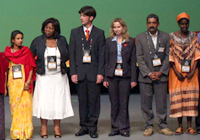
This year, more 550 nominations were
received for the award from 140 countries
around the world.
Credit: UNAIDS/agencialibrefoto
The 25 Red Ribbon Award 2008 winning organizations are also participating in the XVII International AIDS Conference, in Mexico City 3-8 August 2008 where they are hosting the Community Tequio in the heart of the Global village. “Tequio” is an Aztec word conveying a collective work that benefi¬ts the community and the goal is developing an enabling environment for community participation in the AIDS response.
The Community Tequio is a space for conference participants from around the world to interact and share their experiences to strengthen an international network of community best practices on HIV. Open and active discussions are taking place highlighting stories of grassroots victories, challenges communities face and opportunities to improve their response to the epidemic.
Red Ribbon Award
The Red Ribbon Award is presented every two years at the International AIDS Conference to recognize and celebrate outstanding community leadership and action that is helping to stop the spread of HIV and mitigate the impact of AIDS. This year, more 550 nominations were received for the award from 140 countries around the world.
The Red Ribbon Award Secretariat is hosted and by UNDP and supported by the XVII International AIDS Conference, the Canadian International Development Agency, Irish Aid and the Norwegian Ministry of Foreign Affairs. It is a UNAIDS family initiative.
Red Ribbon Award winners honoured
Press centre:
Local communities lead the way at AIDS 2008 (7 August 2008)
UNAIDS announces winners of Red Ribbon Award 2008 (11 June 2008)
External links:
AIDS 2008 official web site
Red Ribbon Award official web site ( es | fr )
Publications:
2008 Red Ribbon Award Winners (pdf, 20 kb)

Feature Story
The Lancet: Series on HIV prevention launched
06 August 2008
06 August 2008 06 August 2008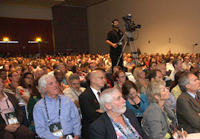
The Lancet in conjunction with UNAIDS
has produced a special series of six major articles on the future of global HIV prevention and held a lunchtime symposium with the authors on 5 August during the International AIDS conference Mexico City.
Credit: UNAIDS/agencialibrefoto
25 years into the global AIDS response it is clear that advances made in HIV prevention have not been sufficient to get ahead of the epidemic.
The Lancet in conjunction with UNAIDS has produced a special series of six major articles on the future of global HIV prevention and held a lunchtime symposium with the authors and editors on 5 August during the International AIDS conference Mexico City.
The papers address the history of the global response to HIV, the evidence for biomedical interventions, how to improve behavioural approaches, addressing and understanding structural approaches, and how to make HIV prevention programmes work more effectively. They cite the successes and failures in HIV prevention to date, and conclude with a call to action for combination prevention to be implemented on a massive scale.
Coming to terms with complexity

UNAIDS Executive Director Dr Peter Piot.
Credit: UNAIDS/agencialibrefoto
The sixth article, by UNAIDS Executive Director Dr Peter Piot*, argues that the key challenges to more effective HIV prevention lie in addressing sex, including being frank with young people; dealing with drug use rationally, and looking to the long term.
“Coming to terms with complexity” proposes that tailored “combination prevention” is as necessary as “combination treatment” when it comes to stopping the HIV epidemic. The paper explores the core technical, political and capacity gaps which stand in the way of fully effective combination prevention and is a call to action to overcome these challenges and to sustain an HIV prevention movement that mobilizes to curb HIV transmission globally.
*Authors of “Coming to terms with complexity: A call to action for HIV prevention”: Peter Piot (UNAIDS), Michael Bartos (UNAIDS) Heidi Larson (Clark University/Harvard University), Purnima Mane, (UNFPA), Debrework Zewdie (World Bank).
|
Call to action
|
The Lancet
As a leading independent journal of global medicine, The Lancet is committed to advancing health for all people around the world. It publishes research aimed at changing medical practice and adding informed analysis and opinion to scientific and policy debates. The aim of the The Lancet Global Health Network site is to bring together international scientific and public health experts. The network synthesizes evidence, conducts new analyses, devises programmatic recommendations, and formulates proposals for action in international health and development. The series can be accessed on The Lancet Global Health Network web site
The Lancet Series on HIV Prevention
1. The history and challenge of HIV prevention Jeffrey O'Malley
2. Biomedical interventions to prevent HIV: Evidence, challenges and the way forward Nancy Padian
3. Behavioral strategies to reduce HIV transmission: How to make them work better Thomas Coates
4. Understanding and addressing structural factors in HIV prevention Jessica Ogden
5. Making HIV prevention programmes work Stefano M Bertozzi
6. Coming to terms with complexity: A call to action for HIV prevention Peter Piot
The Lancet: Series on HIV prevention launched

Feature Story
International AIDS Society marks 20 years
06 August 2008
06 August 2008 06 August 2008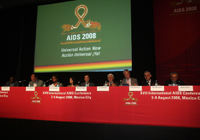
The International AIDS Society held a
special event during the XVII International
AIDS Conference to celebrate its 20th
anniversary.
Credit: UNAIDS/agencialibrefoto
In 1981 the first cases of unusual immune system failures were identified among gay men, women and injecting drug users. Some seven years later a group of prominent scientists from around the world came together to found the International AIDS Society (IAS) – an organisation which would organise international conferences on AIDS bringing together scientists, activists, researchers, people living with HIV and others working on AIDS issues to share knowledge and experiences in responding to the epidemic.
Since this time the IAS has convened the world’s largest meetings on HIV which are now held every two years.
2008 marks the 20th anniversary of the IAS and to commemorate the last 20 years, the IAS held a special event during the XVII International AIDS Conference which is taking place in Mexico from 3-8 August 2008.
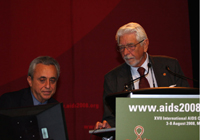
Dr Pedro Cahn, IAS President and
Co-Chair of the XVII International AIDS
Conference (left) and former IAS President
and UN Special Envoy for AIDS in Eastern
Europe and Central Asia Professor Lars O.
Kallings.
Credit: UNAIDS/agencialibrefoto
The event brought together a number of past IAS Presidents, including Dr Peter Piot, UNAIDS Executive Director and Founding President of the IAS, and UN Special Envoy for AIDS in Eastern Europe and Central Asia Professor Lars O. Kallings.
Professor Kallings spoke about the IAS in the early years of the epidemic and Dr Piot looked to the future and spoke of the long term response to the epidemic. Kate Thomson, Chief of Civil Society Partnerships at UNAIDS gave a history of the involvement of people living with HIV in both the International AIDS Conference and the response to the epidemic
International AIDS Society marks 20 years
Feature stories:
Anti-stigma campaign to be launched at Mexico AIDS Conference (28 July 2008)
Multimedia:
Watch video or listen to podcast of this event
External links:
International AIDS Society web site
IAS at 20 years
Publications:
20 Years of the International AIDS Society: HIV Professionals Working Together to Fight AIDS

Feature Story
Official opening of the Global Village at AIDS 2008
05 August 2008
05 August 2008 05 August 2008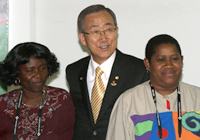
UN Secretary-General Ban Ki-moon met with participants from the Community Dialogue space during the official opening of the Global Village at AIDS 2008
Credit: UNAIDS/agencialibrefoto
At the very heart of the XVII International AIDS Conference is the Global Village, an area of over 8,000 square metres open to everyone attending AIDS 2008, including community organizations from around the world, local and national groups and the general public.
On 4 August, United Nations Secretary-General Ban Ki-moon and UNAIDS Executive Director Dr Peter Piot officially opened the Village which for the coming week will be a space where thousands of visitors—the general public, communities living with and affected by HIV, policy-makers, researchers and other stakeholder groups—will interact and debate, share knowledge and skills, build coalitions and exchange ideas.

On 4 August, United Nations Secretary-General Ban Ki-moon and UNAIDS Executive Director Dr Peter Piot officially opened the Village
Credit: UNAIDS/agencialibrefoto
The aim of the space is to enable greater civil society involvement and strengthen diverse communities’ involvement and participation in shaping the response to HIV.
Official opening of the Global Village at AIDS 20
External links:

Feature Story
Special Session on the global financial architecture for AIDS
05 August 2008
05 August 2008 05 August 2008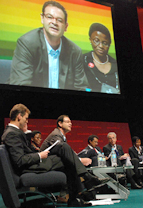
Credit: UNAIDS/agencialibrefoto
The shifting dynamics of the AIDS global financial architecture were explored in depth at a Special Session held on 5 August during the International AIDS Conference taking place in Mexico.
The interactive session brought together leaders from major AIDS donors and recipient countries including the United Kingdom, Ethiopia, Botswana and the Netherlands, as well as UNAIDS, WHO, the Global Fund, the World Bank, PEPFAR and civil society advocates, to reflect on the challenges posed by the current global funding architecture in delivering effective and efficient AIDS programmes.
The panelists explored the complex dynamics facing recipient governments and implementers, donor governments and other financial mechanisms, and global agencies. In the past five years, financial resources for the AIDS response have significantly increased and there has been a rapid scale-up of programming in the context of commitments to achieve universal access to HIV prevention, treatment, care and support services by 2010. The goal is to ensure that HIV programmes are evidence-based and meet international standards, and the challenge is to “make the money work”.

Michel Sidibe, Assistant Secretary-General and UNAIDS Deputy Executive Director of Programmes
Credit: UNAIDS/agencialibrefoto
Michel Sidibe, Assistant Secretary-General and Deputy Executive Director of Programmes, UNAIDS, discussed the challenges to ensuring that global standards are upheld as services are scaled up.
As well as advocating for the need to build adequate and sustained long-term financing for HIV programmes, Mr Sidibe spoke of the importance of strengthening health systems and improving coordination and harmonization. Mr Sidibe was instrumental in developing and implementing the “Three Ones” principles to better coordinate national AIDS responses.
The session was co-chaired by health economist Professor Jean-Paul Moatti and the Dutch AIDS Ambassador Paul Bekkers.
Participants:
Malcolm McNeil, Team Leader within the Policy and Research Division at the UK Department for International Development.
Michel Sidibe, Assistant Secretary General and Deputy Executive Director of Programmes UNAIDS
Ambassador Mark R. Dybul, United States Global AIDS Coordinator
Joy Phumaphi, Vice President of the World Bank’s Human Development Network
Alvaro Bermejo, Executive Director, International HIV/AIDS Alliance
Tedros Adhanom Ghebreyesus, Minister of Health of the Federal Democratic Republic of Ethiopia
Professor Michel D. Kazatchkine, Executive Director of the Global Fund to Fight Aids, Tuberculosis and Malaria
Mphu Keneiloe Ramatlapeng, Minister of Health and Social Welfare of Lesotho
Hiroki Nakatani, Assistant Director-General - HIV/AIDS, TB, Malaria and Neglected Tropical Diseases, World Health Organization
Special Session on the global financial architect
Feature stories:
UNAIDS and Kaiser Family Foundation release new report assessing funding for AIDS by G8 countries and other major donors (06 July 2008)
International Health Partnership launches new web site (07 May 2008)
Multimedia:

Feature Story
AIDS 2008 opens
04 August 2008
04 August 2008 04 August 2008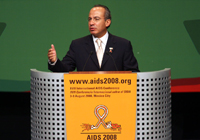
President of Mexico, Felipe de Jesús
Calderón Hinojosa at the opening of XVII
International AIDS Conference, Mexico City.
Credit: UNAIDS/agencialibrefoto
With great celebration and a characteristically warm Latin American welcome, the XVII International AIDS Conference opened on Sunday 3 August in Mexico City. Thousands of delegates from all over the world will spend the next week participating in conference sessions, satellite meetings, exhibitions as well as the Global Village and a wide cultural programme.
The event, the largest AIDS conference in the world, is held every two years and in 2008 for the first time it is taking place in the Latin America region.
The opening event included welcoming remarks by AIDS 2008 Co-Chairs, Dr Pedro Cahn and Dr Luís Soto Ramírez and addresses by high level dignitaries including Dr José Ángel Córdoba Villalobos, Secretary of Health, Mexico; Dr María Teresa Fernández de la Vega, First Vice President of Spain and Minister of the Presidency; Dr Denzil Douglas, Prime Minister of St. Kitts and Nevis and President Felipe Calderón Hinojosa, President of Mexico.

Secretary General of United
Nations, Ban Ki-Moon also
addressed the opening ceremony
of AIDS 2008.Credit:
UNAIDS/agencialibrefoto
Representing the United Nations, Secretary General of United Nations, Ban Ki-Moon; Executive Director of UNAIDS Dr Peter Piot and Director General of World Health Organization Dr Margaret Chan also addressed the opening ceremony.
Twelve-year old Keren Dunaway-González from Honduras gave the Youth Welcome address and the Community Welcome was by Mony Pen from Cambodia
The opening of the XVII International AIDS Conference also featured the Red Ribbon Award Recipients and entertainment by the Mexican Folk Ballet Amalia Hernández and the music group “HIV is not a rock band!” and was broadcast live in Global Village.
World leaders and HIV experts join community activists
The conference theme, Universal Action Now! emphasizes the need for continued urgency and action on the part of all involved in the worldwide response to AIDS.

Executive Director of UNAIDS Dr Peter Piot
Credit: UNAIDS/agencialibrefoto
AIDS 2008 is convened by the International AIDS Society. Local partners include the Federal Government of Mexico, the Government of Mexico City and local scientific and community leadership. International institutional partners for AIDS 2008 include: Joint United Nations Programme on HIV/AIDS, and its cosponsors, the World Health Organization and World Food Programme; International Council of AIDS Service Organizations; Global Network of People Living with HIV/AIDS /International Community of Women Living with HIV/AIDS; World YWCA; and the Asian Harm Reduction Network.
AIDS 2008 opens
Partners:
Press centre:
Speech by Dr Peter Piot UNAIDS Executive Director at the opening of the XVIIth International AIDS Conference, Mexico, 3 August 2008
Speech by Dr Maragaret Chan Director-General of the World Health Organization at the opening of the XVII International AIDS Conference Mexico City, Mexico, 3 August 2008: "HIV/AIDS: Universal action now"
External links:
Multimedia:

Feature Story
Leaders pledge to promote sexual health to stop HIV in Latin America and the Caribbean
03 August 2008
03 August 2008 03 August 2008
Credit: UNAIDS/agencialibrefoto
At the conclusion of the 1st Meeting of Ministers of Education and Health to prevent HIV in Latin America and the Caribbean, Ministers of Education and Health have signed an historic declaration pledging to provide comprehensive sex education as part of the school curriculum in Latin America and the Caribbean.
Ministerial Declaration
The Ministers committed to promoting concrete actions for HIV prevention among young people in their countries by implementing sex education and sexual health promotion programmes.
The sex education programmes will cover a broad range of topics including biological information, social and cultural information with discussion on gender, diversity of sexual orientation and identity along with ethics and human rights.
The Declaration also recognized the responsibility of the State to promote human development, including education and health, as well as to combat discrimination.
Promoting sexual health to impact HIV prevention
The meeting took place on 1 August 2008 and was co-hosted by Dr. José Ángel Córdova Villalobos (MÉxico), Minister of Health and Lic. Josefina Vázquez Mota (Mexico), Minister of Public Education in collaboration with Canciller Patricia Espinosa Cantellano (MÉxico), Minister of Foreign Affairs.
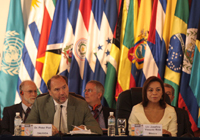
Credit: UNAIDS/agencialibrefoto
UNAIDS Executive Director Dr Peter Piot and UNFPA Executive Director, Dr Thoraya Ahmed Obaid delivered an address on HIV prevention on behalf of the UN System.
The Ministerial meeting was preceded by a technical meeting held on 31 July. Advisors to the Ministers of Health and Education, technical experts from UN agencies, academics and civil society representatives discussed a broad range of issues around comprehensive sexuality education and HIV prevention.
Discussions took place in three regional working groups and included analysis of the barriers to strengthening sexuality education and sexual health promotion programmes and how to enhance collaboration between the Ministries of Health and Education.
Leaders pledge to promote sexual health to stop H
Speech:
Speech by Dr Peter Piot, UNAIDS Executive Director at the 1st Meeting of Ministers of Education and Health to prevent HIV in Latin America and the Caribbean - Mexico City, 1 August 2008
Publications:
Related

Feature Story
Bishop washes feet of HIV-positive women as faith community reach out to people living with HIV
03 August 2008
03 August 2008 03 August 2008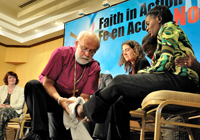
Bishop Mark Hanson, presiding bishop of the Evangelical Lutheran Church in America and president of the Lutheran World Federation, washes the feet of two HIV positive women during the August 1 plenary of the Ecumenical Pre-Conference. On the right is Herlyn Marja Uiras, of Churches United Against HIV and AIDS in Southern and Eastern Africa. Third from right is Sophie Dilmitis, HIV and AIDS coordinator for the World YWCA. Between the two women is Nyaradzai Gumbonzvanda, general secretary of the World YWCA.
Credit: Ecumenical Advocacy Alliance
Engaging in an act of “humility and repentance,” a world church leader began his presentation to an international ecumenical AIDS conference by washing the feet of two women living with HIV.
The Rev. Mark S. Hanson, presiding bishop of the Evangelical Lutheran Church in America (ELCA), Chicago, and president of the Lutheran World Federation, Geneva, washed the feet of Herlyn Marja Uiras of Churches United Against HIV and AIDS in Southern and Eastern Africa and Sophie Dilmitis of World YWCA, Geneva.
Hanson was part of a plenary session addressing stigmatization and discrimination against people living with HIV. He said washing the womens’ feet was the only way he could begin his remarks with integrity.
“I am absolutely convinced that we as religious leaders and we in the religious community that so shunned and shamed people with HIV and struggling with AIDS … must begin first by engaging in public acts of repentance. Because absent public acts of repentance, I fear our words will not be trusted,” he said.
Following the act of repentance, a delegation of religious leaders from the Ecumenical pre-conference went to the Positive Leadership Summit “Living 2008” to share this with the delegates. The religious leaders were warmly received and joined the closing reception of the conference. Delegates from “Living 2008” sent a message to the faith based leaders, conveyed to the closing plenary by members of INERELA+, the International Network of Religious Leaders Living with or Personally Affected by HIV and AIDS:
“What we most want is simply to be accepted rather than tolerated
Accepted as people living with HIV
Accepted as men who have sex with men
Accepted as people who use drugs
Accepted as people who want families and can be responsible parents
Accepted for who we are.”
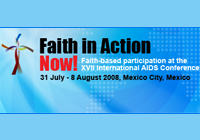
The three-day Ecumenical pre-conference was held under the theme of "Faith in Action Now!" and took place in Mexico City on 31 July - 2 August 2008. Approaching 500 participants from all over the world explored the challenges posed by HIV and the AIDS epidemic to people of faith, evaluated action taken, and planned strategies required in the Christian response to HIV and AIDS.
UNAIDS Senior Partnership Adviser Pauline Muchina made a number of presentations and Sally Smith UNAIDS Partnership Adviser led a workshop for faith-based organizations (FBOs) in collaboration with the Ecumenical Advocacy Alliance, on engaging with the recently drafted UNAIDS strategy on Religion and FBOs.
The Ecumenical Pre-conference is just one of several faith-related events in the run up to and during this year’s International AIDS Conference taking place in Mexico City.
On 2 August an evening celebration took place to mark 5 years of advocacy in Africa by ANERELA+, the African Network of Religious Leaders Living with and Personally Affected by HIV and AIDS, and to mark the formal launch of INERELA+. The network is based on the power of religion to promote human rights and positive social change. It seeks to be a global movement to challenge HIV-related silence, stigma and discrimination and to advocate for evidence-based prevention and treatment for all.
The Inaugural Summit of Religious Leaders Living with HIV begins on 3 August. It will provide a space for people living with HIV who are religious leaders to discuss their priorities and future plans for a High Level Meeting of Religious Leaders. The summit will concentrate on three topics: overcoming stigma and discrimination; living positively with HIV and mobilizing and empowering faith communities and other religious leaders. INERELA+ will bring together around 50 faith leaders who live with HIV, from a wide variety of faith traditions and countries.
Bishop washes feet of HIV-positive women as faith
Feature stories:
Positive Leadership Summit 2008 (31 July 2008)
Multimedia:
External links:
Ecumenical Pre-Conference 2008: Faith in Action Now!
ANERELA+ (African Network of Religious Leaders living with or personally affected by HIV and AIDS)

Feature Story
Women and AIDS: First Ladies and women leaders of Latin America meet
02 August 2008
02 August 2008 02 August 2008
Coalition of First Ladies and Women Leaders of Latin America on Women and AIDS made a personal tribute to Dr Peter Piot in recognition of his committed work on women and AIDS
Credit: UNAIDS/agencialibrefoto
The 5th Meeting of the Coalition of First Ladies and Women Leaders of Latin America on Women and AIDS was opened on 2 August 2008 by Mrs. Margarita Zavala, wife of the President of Mexico, First Lady of Mexico
The meeting brought together more than 150 participants, women leaders and activists from across Latin America, who discussed the challenges related to the feminization of the epidemic and possible HIV prevention strategies. They shared their different country experiences from Guatemala, Peru, Costa Rica, Argentina and Mexico.
Eight First Ladies of Latin America participated in the meeting including Mrs. Vivian Fernández de Torrijos, First Lady of Panamá and Mrs Xiomara Castro de Zelaya, First Lady of Honduras and President of the Coalition of First Ladies and Women Leaders of Latin America on Women and AIDS.
Women and AIDS
The “2008 report on the global AIDS epidemic” reported that increasing numbers of women are becoming infected with HIV in several countries in Latin America, including Argentina, Brazil, Peru, and Uruguay.
The effects of gender inequality and violence leave women and girls more at risk of exposure to HIV. Less access to education and economic opportunity results in women being more dependent on men in their relationships, and many who have no means of support must resort to bartering or selling sex to support themselves and their children.
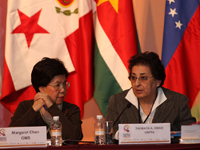
(from left) Margaret Chan of WHO and Thoraya Obaid of UNFPA during the Fifth Meeting of the Coalition of First Ladies and Women Leaders of Latin America on Women and AIDS on 2 August 2008.
Credit: UNAIDS/agencialibrefoto
Women and girls are also at increased risk for HIV infection biologically. In unprotected heterosexual intercourse women are twice as likely as men to acquire HIV from an infected partner. Economic and social dependence on men often limits women's power to refuse sex or to negotiate the use of condoms.
Coalition of First Ladies and Women Leaders of Latin America on Women and AIDS
In order to address the impact of HIV on women and girls in Latin America, the Coalition was set up in 2006 under the leadership of the First Lady of Honduras, Mrs. Xiomara Castro de Zelaya, to promote political commitment and mobilization of regional and national resources to strengthen and enhance HIV prevention, treatment and care services and reduce the impact of the epidemic on women and girls. The Coalition is also concerned at the gaps between the genders in terms of access to HIV prevention, testing, treatment and care services.
Members of the Latin America Coalition include women leaders from the ICW (International Community of Women Living with HIV). The Coalition is committed to working in partnership with women living with HIV and adopted the 2006 Panama Declaration "Nothing for us, without us”, as the basis of their regional action plan.
This Declaration was adopted at the 1st Latin America and Caribbean Congress of Women and Girls and sets out the commitment that the AIDS response must include people living with HIV working along side the most powerful forces uniting all nations and harmonizing their mutual concern and identities.
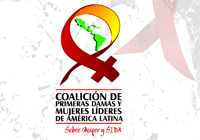
The 5th Meeting of the Coalition of First
Ladies and Women Leaders of Latin
America on Women and AIDS was
opened on 2 August 2008
At the conclusion of the meeting, the Coalition approved a statement on Women and AIDS in which they commit to work closely with community leaders and continue to advocate for stopping the feminization of the epidemic and eradicating the social, cultural and economic constraints that affect women, girls and teenagers.
They also highlighted the importance of supporting people living with or at higher risk of HIV and to speak out against discrimination and violence towards women and girls.
Executive Director of UNAIDS Dr Peter Piot delivered a speech on the international response to the impact of the HIV epidemic on women and the Coalition made a personal tribute to him in recognition of his committed work on women and AIDS.
Women and AIDS: First Ladies and women leaders of
Partners:
The Global Coalition on Women and AIDS
ICW (International Community of Women Living with HIV/AIDS)
Feature stories:
Leadership and AIDS: Patricia Pérez (8 April 2008)
Women leading the AIDS response in Latin America (28 March 2008)
Third meeting of the Coalition of First Ladies and Women Leaders of Latin America on HIV, Honduras - Photo gallery
Women join forces in Latin America (30 October 2007)
Interview with Xiomara Castro de Zelaya, the First Lady of Honduras (pdf file)
Speech:
Speech Dr Peter Piot, UNAIDS Executive Director at the 5th meeting of the Regional Coalition of First Ladies and Women Leaders of Latin America on Women and AIDS. Mexico City, 2 August 2008
Speech by the UNAIDS Deputy Executive Director at the Latin American Women's summit (pdf file) (30 Oct 2007)
External links:
Coalition of First Ladies and Women Leaders of Latin America on Women and AIDS
Publications:
2008 report on the global AIDS epidemic
The Panama Declaration 2006: "Nothing for us, without us"

Feature Story
Historic signing at White House brings leaders together
01 August 2008
01 August 2008 01 August 2008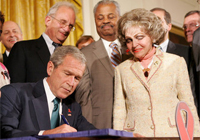
President George W. Bush is joined by Annette Lantos, right, and invited guests Wednesday, July 30, 2008 in the East Room of the White House, as he signs H.R. 5501, the Tom Lantos and Henry J. Hyde United States Global Leadership Against HIV/AIDS, Tuberculosis and Malaria Reauthorization Act of 2008. White House photo by Joyce N. Boghosian.
On 30 July 2008, US President George W. Bush signed the Tom Lantos and Henry J. Hyde United States Global Leadership against HIV/AIDS, Tuberculosis and Malaria Reauthorization Act of 2008. This legislation replaces and extends the existing act by five years and also expands it three-fold to US$ 48 billion.
A number of guests joined President Bush in the White House for this historic event. They included senior members of the US House and the US Senate and Congressional and agency staff as well as family members of the politicians Tom Lantos and Henry J. Hyde in whose memory the act honours.
President Bush expressed his appreciation to Dr Peter Piot, UNAIDS Executive Director for attending and thanked him and Rajat Gupta, the Chairman of the Board of the Global Fund to Fight AIDS, Tuberculosis and Malaria for their presence.
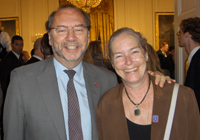
(left to right) Dr Peter Piot, UNAIDS Executive Director and Michele Moloney-Kitts, Assistant U.S. Global AIDS Coordinator at the White House on the day U.S. President George W. Bush signed the Tom Lantos and Henry J. Hyde United States Global Leadership against HIV/AIDS, Tuberculosis and Malaria Reauthorization Act of 2008, 30 July 2008
Dr Peter Piot paid tribute to the leadership of the President and the US Congress: “The generosity of the US government has helped to truly transform the global response to AIDS and the course of the epidemic. It has enabled all of us to make a qualitative and quantum leap forward.”
President Bush acknowledged that AIDS is a long-term crisis that will require serious commitment and resources for decades: “Defeating HIV/AIDS once and for all will require an unprecedented investment over generations. But it is an investment that yields the best possible return: saved lives.”
President Bush first announced the President's Emergency Plan for AIDS Relief (PEPFAR) in a State of the Union address in 2003 and a US$ 15 billion act was passed by US Congress that same year.
Joining the President on the occasion of the signing of the reauthorization, were two people directly benefiting from PEPFAR. Agnes Nyamayarwo, from Uganda, who now travels extensively educating people about HIV and Mohamad Kalyesubula, who works in a clinic caring for HIV positive people.
Latest figures show that after decades of increasing mortality, the annual number of AIDS deaths globally has declined in the past two years, in part as a result of greater access to HIV treatment.
Historic signing at White House brings leaders to
Press centre:
Statement by Dr Piot on signing of "Tom Lantos and Henry J. Hyde Global Leadership against HIV/AIDS, Tuberculosis and Malaria Reauthorization Act of 2008" (30 July 2008)
UNAIDS welcomes United States Senate action to renew its global AIDS programme (16 July 2008)



